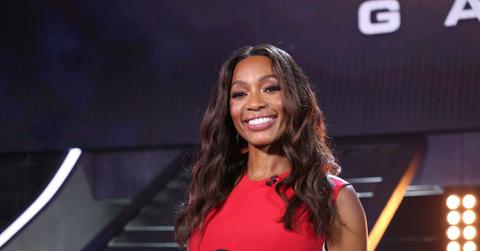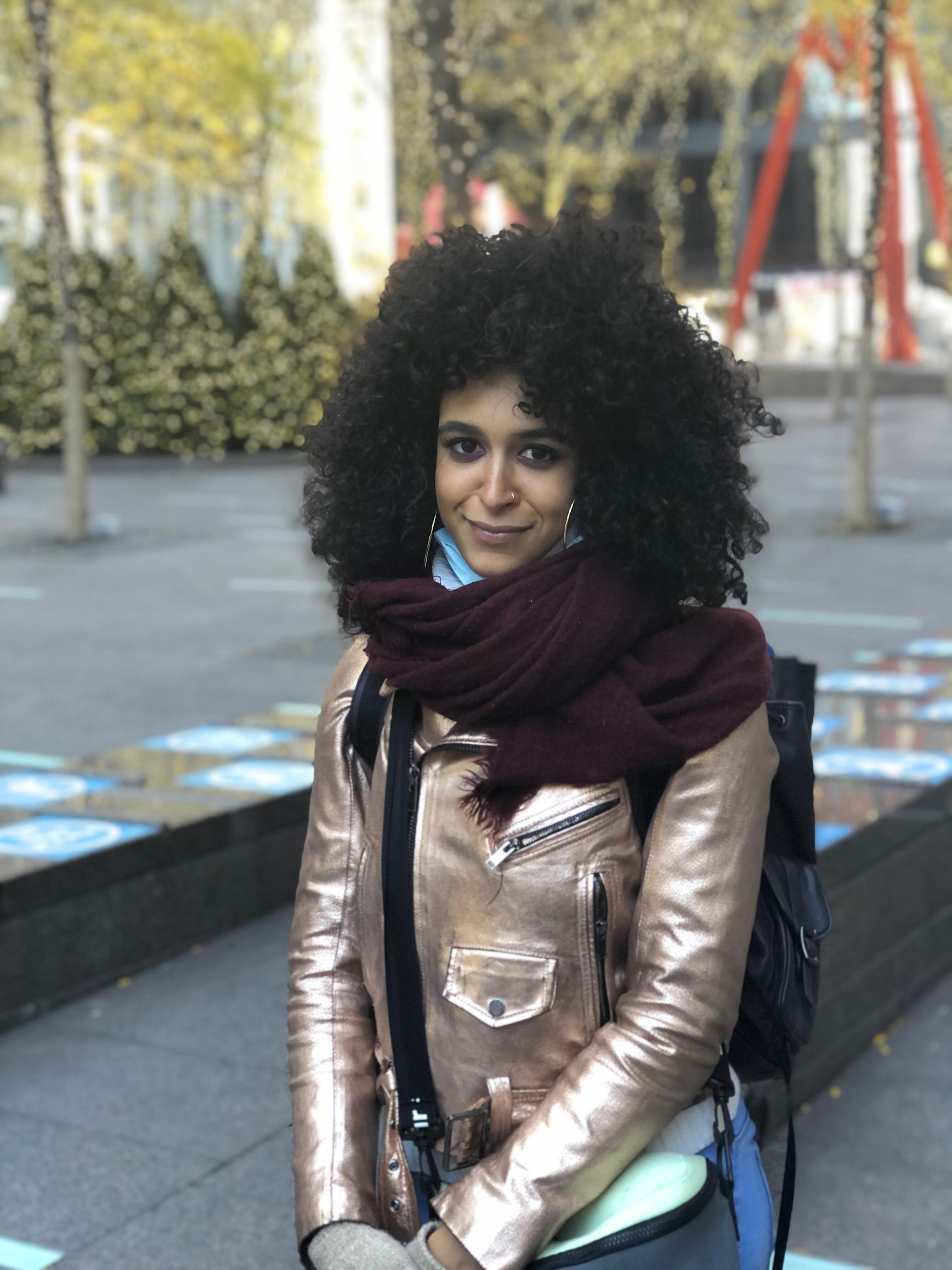For eight years, journalist Cari Champion was one of the few Black women to host on ESPN. Instead of letting the renowned brand define her, she left in January 2020 to pursue her own voice, not knowing that it would lead to having a show with her good friend Jemele Hill, twice. But the most admirable thing about Cari is that regardless of her success, she’s divinely compelled to contribute to the success of others, especially young Black women.
In 2018 she founded Brown Girls Dream, a mentoring program for Black women ages 18-27 working or trying to break through into the entertainment or media industry. In between getting ready to select her upcoming cohort of women and her new show debuting on CNN+ later this spring, Cari met with Her Agenda to talk about everything but sports!
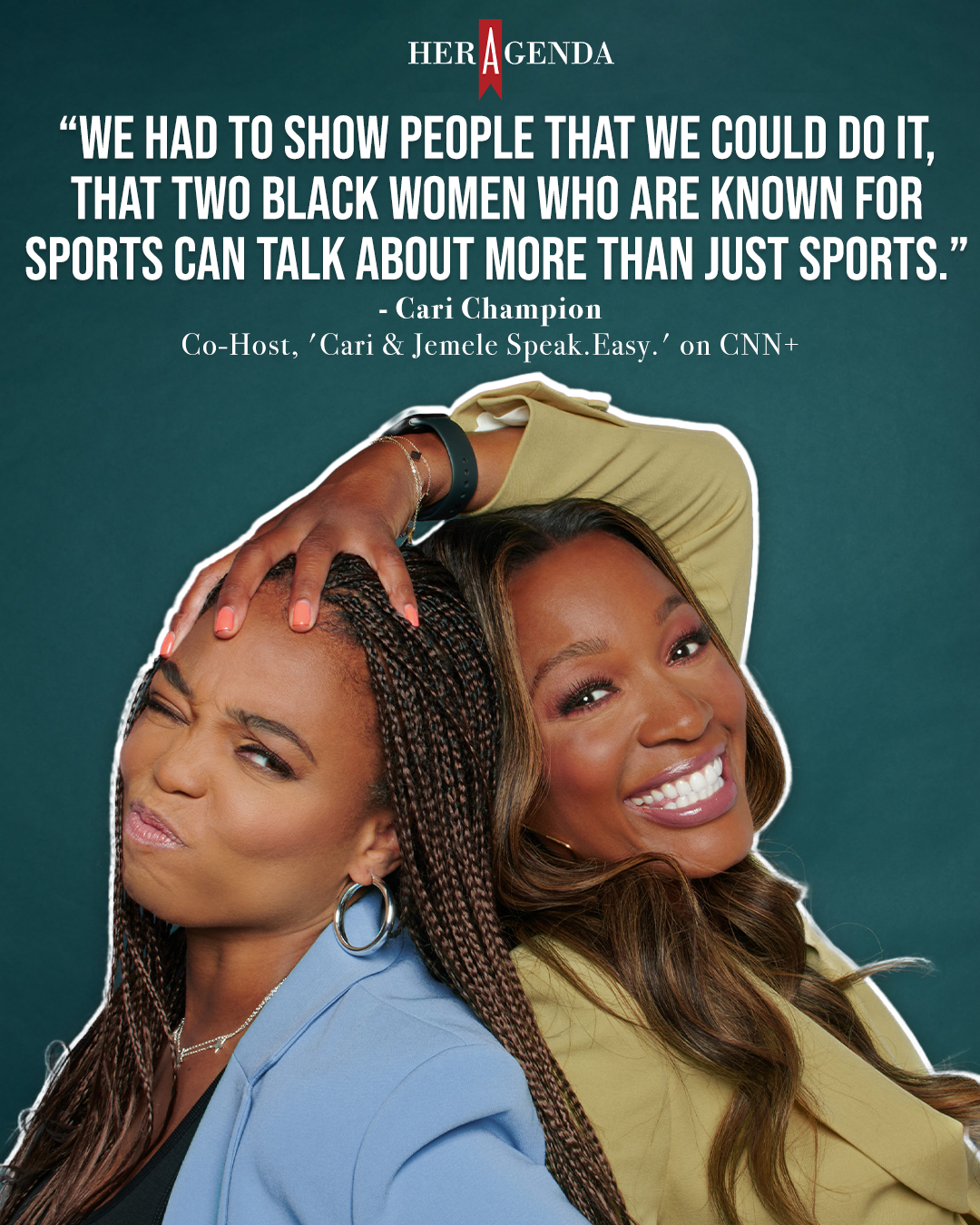
Her Agenda: When I google you, the top suggested search is ‘What is Cari Champion doing?’ because you’re always doing something like your new show on CNN+ with your friend Jemele Hill. What are you excited about this time around with your new show versus your previous one with Jemele, on VICE?
Cari Champion: The show we previously did with VICE, we like to call it a work in progress, a working show. We needed to have some sort of format that said ‘Hey, two Black women can do a TV show.’ We thought our relationship with VICE was the perfect family [although] we didn’t think our relationship would be there for long. But we had to show people that we could do it, that two Black women who are known for sports can talk about more than just sports. We can have conversations about politics with politicians, we could talk about sports with the best athletes, we can talk about action with the best superstars and entertainers of the world. It wasn’t a place where we could be great because I think we did a great job but it was just a proof of concept as they are in the business. It’s hard to change people’s opinions about you and for a long time people just associated us with sports and yup that’s great but we also have a lot to say about what’s happening in society today.
We were able to come up through the ranks in sports and transition into a world where we use our platform to talk about things that affect the community, the culture, and the collective. We felt that we could live elsewhere. And living on CNN is a perfect platform because I think CNN wants to change how its viewers consume politics. It’s a bold step out of their comfort [zone] by hiring Jemele and I. So what you’ll see is arguably a more sophisticated version than what you saw on VICE in terms of us having more capabilities to travel and do more.
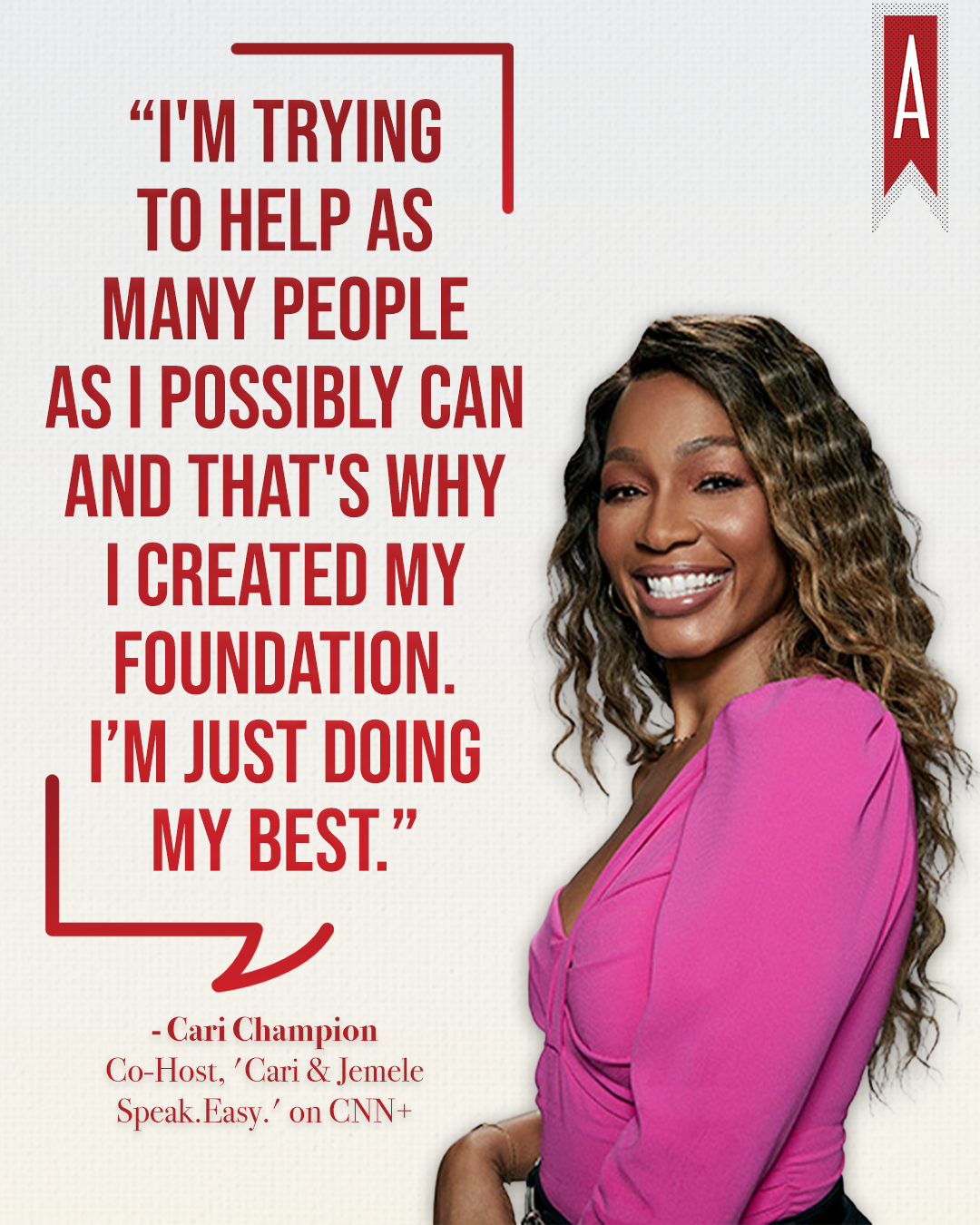
Her Agenda: One thing that you always talk about is the importance of having women beside you in an industry that makes one think ‘only one Black girl can do it.’ I want to focus on your relationship with Jemele and why is it important for you to have that friendship?
Cari Champion: [Our] friendship is important because for a long time I believed that you didn’t need to have friends in the business. And to a degree I understand that and believe that but often times you have this mentality, ‘let me just go to work, do my job, now leave me alone’ and there’s nothing wrong with that but when it becomes toxic or troubling is when you believe you can’t be friends with other people that look like you because you buy into this concept that there [can] only be one. And if you pay attention to what corporate America does, especially in these specialized environments, i.e sports, when there’s one Black girl winning, they think that’s it. They can never promote two of us at the same time. Or one Black guy winning, that’s it, they can never promote two of them at the same time because that’s just enough for them to be comfortable in corporate America which is by in large white and they’re comfortable with just one, not too many in the same space and as a result, we start to believe that.
Women in general have a competitive nature, a different one than men do but a competitiveness, and thanks to Jemele, I was able to shed that stigma that there could only be one. I didn’t want to be her friend, I wasn’t jealous of her but I just didn’t want to be her friend at the time. I’m an only child and I’m grown. I don’t need any more new friends. I’m sure I’m not the only person who feels that way, a lot of people as they get older think they’ve made all their friends and [feel] no need to open themselves up for ridicule or judgment or whatever if you think the worst like I did. It was the best decision that I’ve ever made to get out of my own way and embrace this friendship because she really helped me get through some tough times, personally and professionally, especially when I truly discovered this level of ‘notoriety’ that I wasn’t familiar with. And the reason why she was able to help me was because all she saw was someone winning and if they can see me, a brown girl doing well, then they can see her, a brown girl doing well, and other brown girls doing well. And everyone doesn’t have that mentality, we always have these stories about women not getting along. The reality is that she made it easier for me to thrive, we want to see each other win. There’s no jealousy at all, it’s honest and it’s rare.
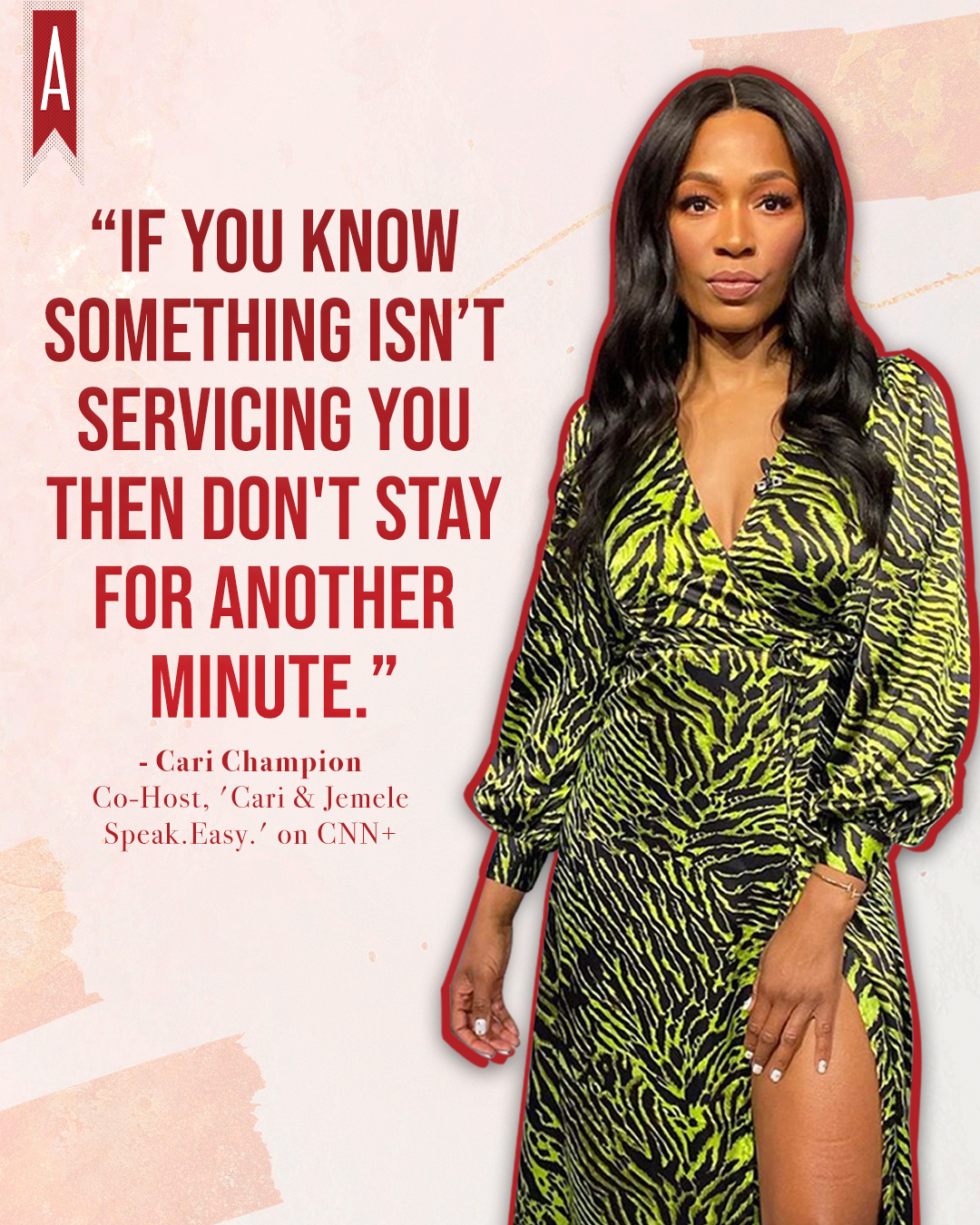
Her Agenda:You and I met because of this fabulous foundation you created, Brown Girls Dream, it’s going on four years now. What are some unexpected things to come about? I want to hear what’s surprised you most after creating it.
Cari Champion: I started this program because I was inundated by a lot of young girls who were asking me how to pursue, function, and thrive in this business and I just wanted to help. But I was also overwhelmed by the number of people who would reach out to me that I couldn’t respond to in time. In fact, I had an example of a young woman who tweeted ‘Well, she never responded back to me but thank God she didn’t, because of that I’ve been able to thrive’ and I replied ‘Ma’am I don’t remember you but tell me how I didn’t respond’ and she said ‘You didn’t reply to my email’ I said, ‘I’m sorry, I don’t want you to think I was ignoring you but you have to understand for every one of you there’s one of me, and there’s like 20 of you.’ I’m trying to help as many people as I possibly can and that’s why I created my foundation. I’m just doing my best. The foundation has had a good impact on so many people. And people are really invested in a group of brown women because the need is so strong
I didn’t know it was as imperative as it was when I first started. What has come out of it is great relationships, great sisterhoods, you girls know each other and that really warms my heart! Also the generosity, people always want to donate. That’s what blows me away. I am just grateful that there were more people who wanted to help than not. Grateful that the girls have come together to love one another and create this secret society if you will. All my friends are mentors and they’ve all been hands on deck. That’s so crazy to me that I started a website one day and decided to post and people just got involved.
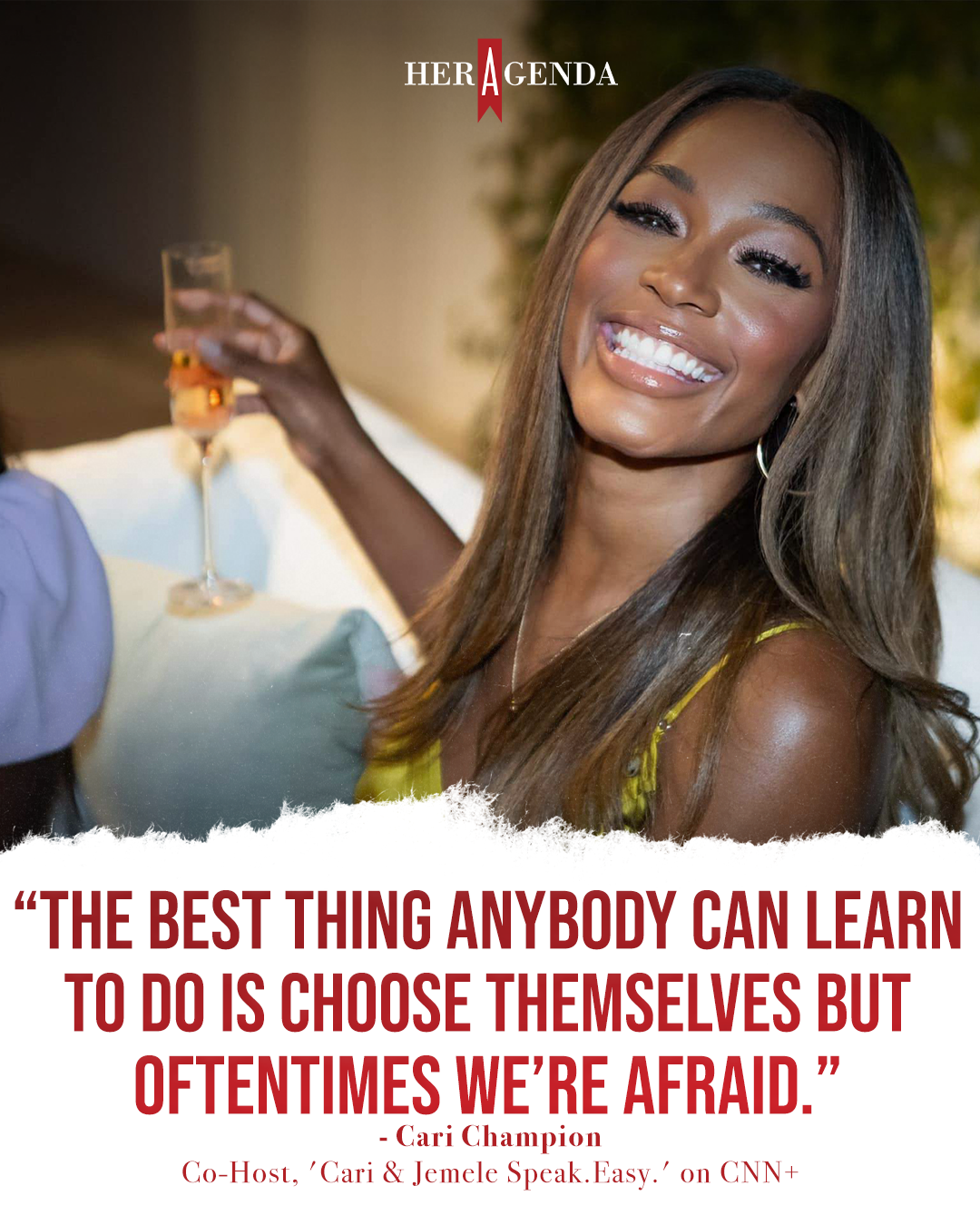
Her Agenda:After eight years in ESPN, you left. For a lot of people ESPN is the end all be all but not for you. Now that you’re on the other sid, what did you learn in that time when you had to choose yourself and everyone was calling you crazy?
Cari Champion: You just have to listen to your gut. I was ready to go long before I left but I was always afraid. I left in January 2020, and if I would have stayed during the pandemic, I would have felt like I could never leave. I would have felt like nobody was hiring and I couldn’t start anything on my own. But I just jumped. My advice is, if you know something isn’t servicing you then don’t stay for another minute. For me, it was starting to affect my overall demeanor and presence, I wasn’t pleasant, I wasn’t kind because I was not happy. I was mad at myself, I was like ‘Cari, how long are you going to keep betraying yourself? How long are you going to let others determine your worth? How long are you going to stay in a circumstance where you’re no longer wanted?’ The best thing anybody can learn to do is choose themselves but oftentimes we’re afraid. I have colleagues who tell me ‘I want to do it but where am I going to go?’ It’s hard leaving a place that’s paying six, seven figures where you also have a platform five days a week. Very few people can disappear and live better but that’s when you ask yourself: how do I really want to live? Do I really want to do this for the fame or do I want to make a difference? And oftentimes people forget. I often felt like I wasn’t making a difference, I wasn’t speaking truth to power and I was very stifled. It was a very suffocating environment for me at the time. When you’re the first, it’s never easy. So people like me and J have to jump ship to show the girls that are coming behind us that they can live better. I don’t know what better means for them but what I do know is that I’m still standing and creating my own way. There is no clear path.
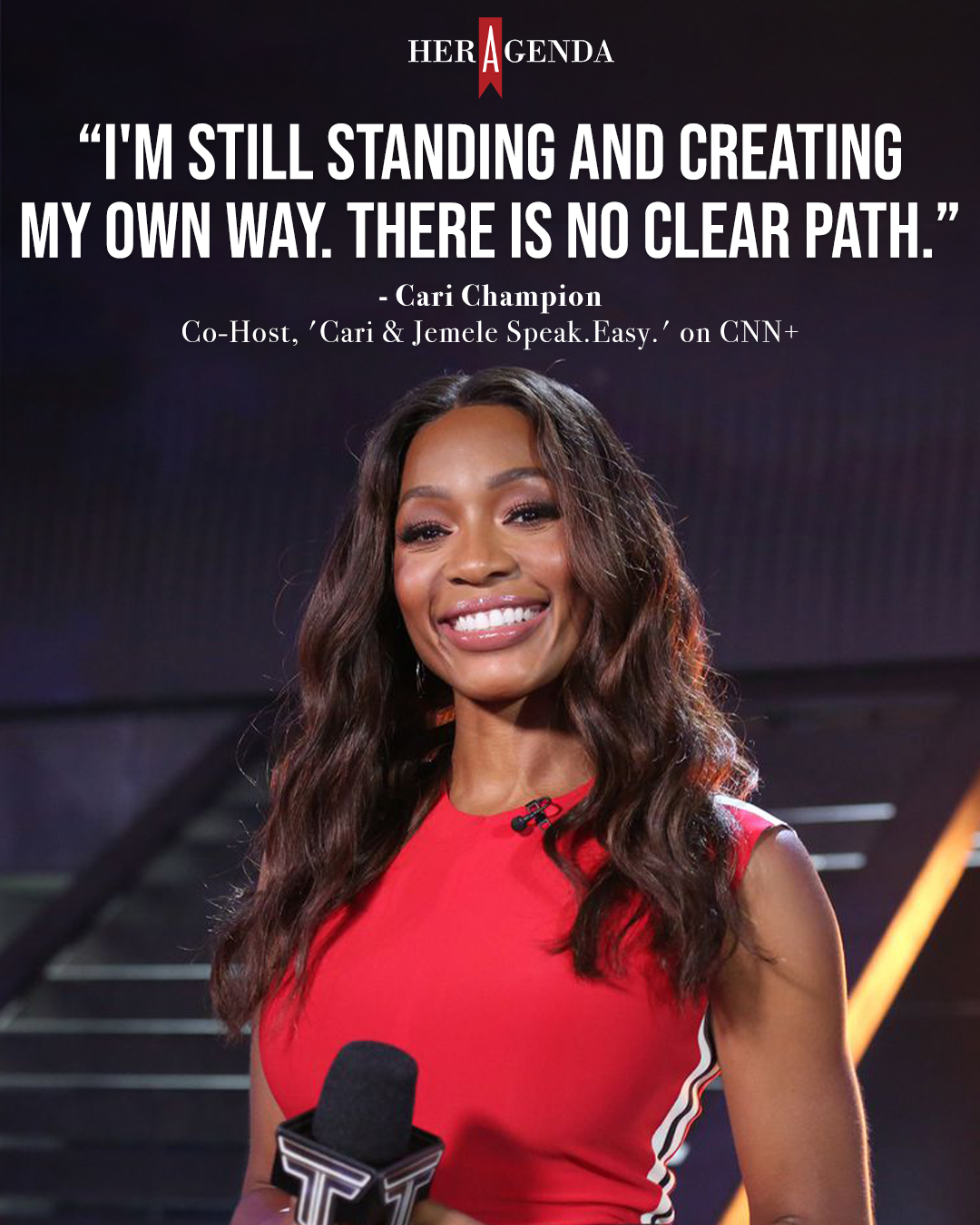
Her Agenda: What did you find out about your own voice now that you’re not under the ESPN umbrella? You can say and do whatever you want and have whatever guest you want.
Cari Champion: I found out that it’s very difficult to speak easily in tough times. It’s difficult to be honest about what’s going on in the world for fear of what happens. I’m on the record saying this, you have to be so comfortable with the pushback or backlash once you go on record with something and that takes an incredible amount of courage. There’s always that time you say something that goes viral and you have to be okay with what you said and I’ve had many of those instances. I have to be okay with all of it, the good and the bad. And that’s a tough decision for a lot of people to make, it’s very difficult to stand in your truth no matter what. And I did that. But with this new show, I’ll be honest, I’m nervous.
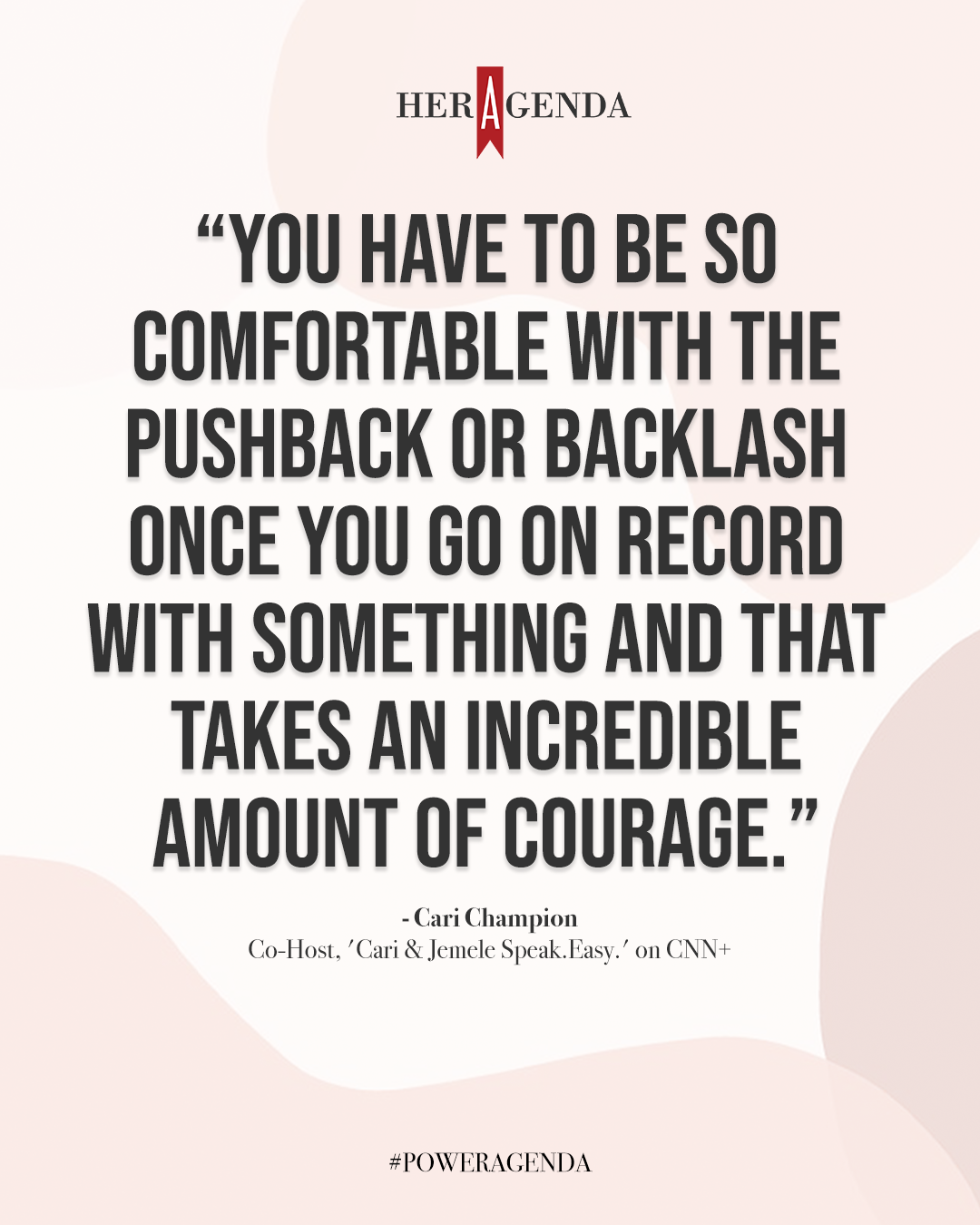
Her Agenda: In researching you, I was surprised to see so many haters. Mostly men writing paragraphs about why you’re wrong. How do you deal with that while still looking so good? How do you keep your north star?
Cari Champion: I don’t get bothered by it at all. You have to realize that when you’re doing well and you’re speaking truth to power, and when you have a platform, people purposely come after you. If I were sitting in a corner and not really affecting anything, then nobody would be writing a paragraph with pushback unless they thought I had influence. So it’s a compliment really when you think about it. Whenever I talk about women’s rights, abortion, pay equality, racism, all pushback. If I go on TV and say the world is great and if you’re a minority, you have to pull yourself up by the boot’s strap, I would be applauded. They would love me. I talk about the truth, I say the quiet parts aloud and nobody wants to hear that because it holds people accountable. I don’t give in to the pressure of what people feel about me because I know I’m on the right side of history.
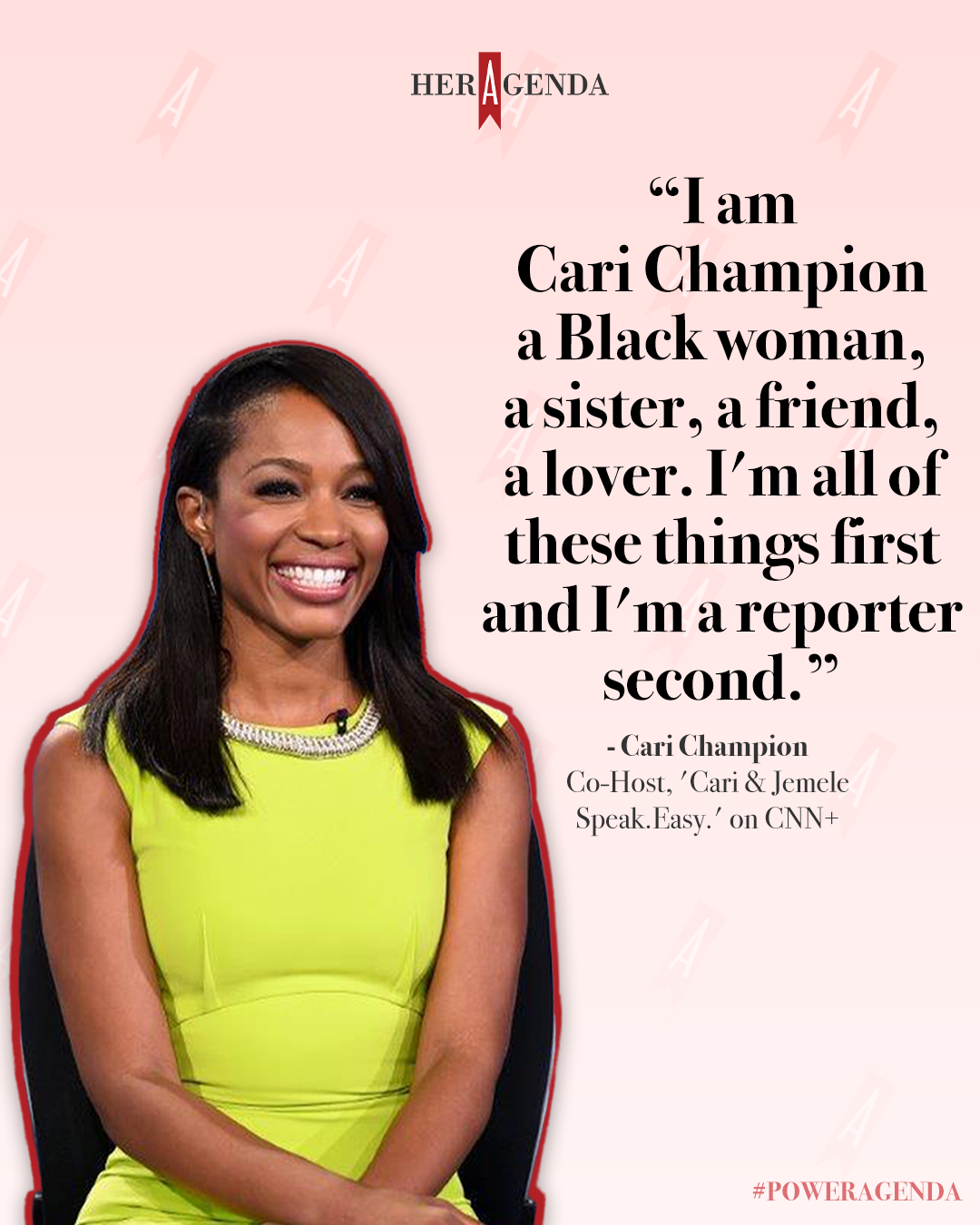
Her Agenda: You believe in the importance of getting fired. It happened to you back in Atlanta but they obviously took you back because you were on the right side of history. That instance must have motivated you because a couple of months later you left. Can you talk about what that moment did for you?
Cari Champion: I was working in Atlanta and I was covering a good story and they gave it to someone else so I let them know that that’s not fair, in a way that only I can. The news director was just tired of me at that point. I was a squeaky wheel in the newsroom because I was always pushing and pushing. They had an opportunity to fire me, that was their way of getting rid of me but I got my job back because they knew they were wrong. The community was giving them so much pushback. I got my job back and then I left because as I told you, personally and professionally if you know you’re not wanted then hit the road. I wasn’t going to stay at a place where I’m not wanted but it was scary. It was during the recession, I didn’t have a job, I was so broke. I was working as a telemarketer and although I had a brand new car, I had $30 in my bank account. I was in so much debt for like almost a year, I thought they were going to repossess everything. It was a tough time for me. I was so humbled because it taught me that I wasn’t what I did, I am who I am. I always said ‘Hi, I’m Cari Champion, the reporter’ but my identity is who I am. I had to learn that, it was such a tough time but I told myself that the next job that I get I know I can survive anything if I can survive this. A year and change without a job because the recession was crazy, nobody was hiring. I cut myself off from people because I was embarrassed.
I am always motivated by the fear of not knowing who I am. I had to do some soul searching. What happened at ESPN didn’t have to do with the big fire in Atlanta, I learned that I am Cari Champion a Black woman, a sister, a friend, a lover. I’m all of these things first and I’m a reporter second. That was most important to me in my next adventure, bringing my full self and being unapologetic in my firmness. I am not going out of my way to make you comfortable if it makes me uncomfortable.
[Editor’s note: This interview has been edited for length and clarity.]

